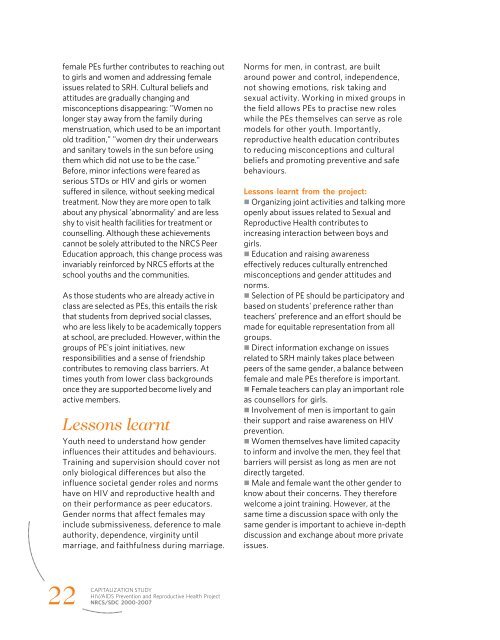HIV/AIDS Prevention & Reproductive Health Project
HIV/AIDS Prevention & Reproductive Health Project
HIV/AIDS Prevention & Reproductive Health Project
Create successful ePaper yourself
Turn your PDF publications into a flip-book with our unique Google optimized e-Paper software.
female PEs further contributes to reaching out<br />
to girls and women and addressing female<br />
issues related to SRH. Cultural beliefs and<br />
attitudes are gradually changing and<br />
misconceptions disappearing: "Women no<br />
longer stay away from the family during<br />
menstruation, which used to be an important<br />
old tradition," "women dry their underwears<br />
and sanitary towels in the sun before using<br />
them which did not use to be the case."<br />
Before, minor infections were feared as<br />
serious STDs or <strong>HIV</strong> and girls or women<br />
suffered in silence, without seeking medical<br />
treatment. Now they are more open to talk<br />
about any physical 'abnormality' and are less<br />
shy to visit health facilities for treatment or<br />
counselling. Although these achievements<br />
cannot be solely attributed to the NRCS Peer<br />
Education approach, this change process was<br />
invariably reinforced by NRCS efforts at the<br />
school youths and the communities.<br />
As those students who are already active in<br />
class are selected as PEs, this entails the risk<br />
that students from deprived social classes,<br />
who are less likely to be academically toppers<br />
at school, are precluded. However, within the<br />
groups of PE's joint initiatives, new<br />
responsibilities and a sense of friendship<br />
contributes to removing class barriers. At<br />
times youth from lower class backgrounds<br />
once they are supported become lively and<br />
active members.<br />
Lessons learnt<br />
Youth need to understand how gender<br />
influences their attitudes and behaviours.<br />
Training and supervision should cover not<br />
only biological differences but also the<br />
influence societal gender roles and norms<br />
have on <strong>HIV</strong> and reproductive health and<br />
on their performance as peer educators.<br />
Gender norms that affect females may<br />
include submissiveness, deference to male<br />
authority, dependence, virginity until<br />
marriage, and faithfulness during marriage.<br />
Norms for men, in contrast, are built<br />
around power and control, independence,<br />
not showing emotions, risk taking and<br />
sexual activity. Working in mixed groups in<br />
the field allows PEs to practise new roles<br />
while the PEs themselves can serve as role<br />
models for other youth. Importantly,<br />
reproductive health education contributes<br />
to reducing misconceptions and cultural<br />
beliefs and promoting preventive and safe<br />
behaviours.<br />
Lessons learnt from the project:<br />
• Organizing joint activities and talking more<br />
openly about issues related to Sexual and<br />
<strong>Reproductive</strong> <strong>Health</strong> contributes to<br />
increasing interaction between boys and<br />
girls.<br />
• Education and raising awareness<br />
effectively reduces culturally entrenched<br />
misconceptions and gender attitudes and<br />
norms.<br />
• Selection of PE should be participatory and<br />
based on students' preference rather than<br />
teachers' preference and an effort should be<br />
made for equitable representation from all<br />
groups.<br />
• Direct information exchange on issues<br />
related to SRH mainly takes place between<br />
peers of the same gender, a balance between<br />
female and male PEs therefore is important.<br />
• Female teachers can play an important role<br />
as counsellors for girls.<br />
• Involvement of men is important to gain<br />
their support and raise awareness on <strong>HIV</strong><br />
prevention.<br />
• Women themselves have limited capacity<br />
to inform and involve the men, they feel that<br />
barriers will persist as long as men are not<br />
directly targeted.<br />
• Male and female want the other gender to<br />
know about their concerns. They therefore<br />
welcome a joint training. However, at the<br />
same time a discussion space with only the<br />
same gender is important to achieve in-depth<br />
discussion and exchange about more private<br />
issues.<br />
22<br />
CAPITALIZATION STUDY<br />
<strong>HIV</strong>/<strong>AIDS</strong> <strong>Prevention</strong> and <strong>Reproductive</strong> <strong>Health</strong> <strong>Project</strong><br />
NRCS/SDC 2000-2007

















